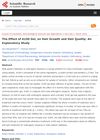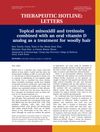 December 2023 in “Journal of Cosmetic Dermatology”
December 2023 in “Journal of Cosmetic Dermatology” The hair growth product was effective and safe, increasing hair growth, thickness, and density while reducing hair fall.
 November 2023 in “International Journal of Medical Sciences”
November 2023 in “International Journal of Medical Sciences” New regenerative medicine-based therapies for hair loss look promising but need more clinical validation.
 November 2023 in “Australasian journal of dermatology”
November 2023 in “Australasian journal of dermatology” Dermatologists are essential in helping transgender and gender diverse patients with skin and hair issues related to gender affirmation and hormone therapy.
 July 2023 in “International Journal of Cosmetic Science”
July 2023 in “International Journal of Cosmetic Science” Biopolymers are increasingly used in cosmetics for their non-toxicity and skin benefits, with future biotech advancements likely to expand their applications.
 June 2023 in “Stem cell reviews and reports”
June 2023 in “Stem cell reviews and reports” Stem cell therapies could be a promising alternative for hair loss treatment, but more research is needed to understand their full potential and safety.
 May 2021 in “Клітинна та органна трансплантологія”
May 2021 in “Клітинна та органна трансплантологія” Skin aging can be slowed down with proper care and treatments.
 January 2018 in “International journal for pharmaceutical research scholars”
January 2018 in “International journal for pharmaceutical research scholars” Meniran extract hair tonic may stimulate hair growth in rats, with the version containing 1% menthol being more effective.
 January 2016 in “Journal of Cosmetics, Dermatological Sciences and Applications”
January 2016 in “Journal of Cosmetics, Dermatological Sciences and Applications” A100 gel may increase hair growth without side effects, but more research is needed.
 1 citations,
May 2016 in “Current Opinion in Pediatrics”
1 citations,
May 2016 in “Current Opinion in Pediatrics” Children's hair loss can be caused by various factors and should be treated with appropriate, age-specific methods and psychological support.
 5 citations,
August 2018 in “PubMed”
5 citations,
August 2018 in “PubMed” An 8-year-old with severe hair loss regrew all hair after six months of tofacitinib treatment.
 127 citations,
July 2002 in “EMBO journal”
127 citations,
July 2002 in “EMBO journal” Normal skin cell renewal doesn't need RAR signaling, but vitamin A-related skin thickening does.
 25 citations,
March 2000 in “Journal of Endocrinological Investigation”
25 citations,
March 2000 in “Journal of Endocrinological Investigation” Testosterone therapy aims to treat hormone deficiencies and various conditions safely and effectively, but requires careful patient monitoring due to potential side effects.

Isotretinoin and tazarotene help treat acne, while minoxidil and finasteride promote hair growth.
 7 citations,
November 2013 in “Pediatrics in Review”
7 citations,
November 2013 in “Pediatrics in Review” Acne is a chronic skin condition not caused by poor hygiene or diet, and it requires long-term treatment and patient education.
 30 citations,
May 2014 in “American Journal of Clinical Dermatology”
30 citations,
May 2014 in “American Journal of Clinical Dermatology” The conclusion is that better understanding and more research are needed to effectively manage follicular and scarring disorders in skin of color, with an emphasis on patient education and cultural awareness.
 6 citations,
July 2003 in “Journal of Womens Health”
6 citations,
July 2003 in “Journal of Womens Health” Experts say proper treatment and sensitivity are important for women's facial skin issues like acne and unwanted hair.
 21 citations,
September 2016 in “Journal of Dermatological Treatment”
21 citations,
September 2016 in “Journal of Dermatological Treatment” The new classification system for skin disorders emphasizes the importance of understanding a patient's awareness of their condition for better treatment.
 May 2003 in “Hair transplant forum international”
May 2003 in “Hair transplant forum international” Strontium can effectively reduce skin irritation and inflammation.
14 citations,
March 2019 in “European journal of pharmaceutics and biopharmaceutics” Proretinal nanoparticles improve skin absorption and reduce irritation of topical retinoids.
 38 citations,
November 2012 in “Expert Opinion on Drug Safety”
38 citations,
November 2012 in “Expert Opinion on Drug Safety” Common acne treatments can cause various side effects, like skin irritation and more serious issues, but combination therapies are often more effective and better tolerated.
 3 citations,
February 2016 in “Dermatologic Therapy”
3 citations,
February 2016 in “Dermatologic Therapy” Using minoxidil and tretinoin on the skin, along with oral vitamin D, improved hair thickness and density in two girls with woolly hair.
 5 citations,
January 2018 in “PubMed”
5 citations,
January 2018 in “PubMed” Biodegradable microneedle patches help topical steroids work better for prurigo nodularis.
 1 citations,
June 2021 in “Journal of Cosmetic Dermatology”
1 citations,
June 2021 in “Journal of Cosmetic Dermatology” Enzyme booster SULT1A1 greatly enhances hair regrowth with minoxidil.

Cosmetics can help with mild skin problems and daily care but must be used carefully to avoid skin irritation.
 10 citations,
January 2017 in “Expert Opinion on Pharmacotherapy”
10 citations,
January 2017 in “Expert Opinion on Pharmacotherapy” The conclusion is that more research is needed to better understand and treat adult acne, and that patient education and simple treatment plans are important for better results.
 1 citations,
March 2023 in “Clinical, Cosmetic and Investigational Dermatology”
1 citations,
March 2023 in “Clinical, Cosmetic and Investigational Dermatology” Current treatments for Alopecia Areata have mixed success, and there's a need for better, more accessible options and support for affected individuals.
 24 citations,
January 2016 in “Lasers in Medical Science”
24 citations,
January 2016 in “Lasers in Medical Science” Erbium glass laser treatment may help with skin remodeling, reduce inflammation, and improve skin cell maturation.
 1 citations,
October 2023 in “Clinical, cosmetic and investigational dermatology”
1 citations,
October 2023 in “Clinical, cosmetic and investigational dermatology” Traditional treatment for pediatric alopecia areata is most effective and should be first choice.
 14 citations,
January 2020 in “Mediterranean Journal of Rheumatology”
14 citations,
January 2020 in “Mediterranean Journal of Rheumatology” New JAK inhibitor drugs show promise for treating skin diseases but need more research on safety and effectiveness.
 8 citations,
September 2015 in “Journal of the European Academy of Dermatology and Venereology”
8 citations,
September 2015 in “Journal of the European Academy of Dermatology and Venereology” Hair and scalp pain is more common and severe in breast cancer patients on chemotherapy than those on tamoxifen.





























